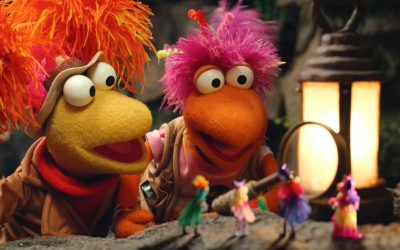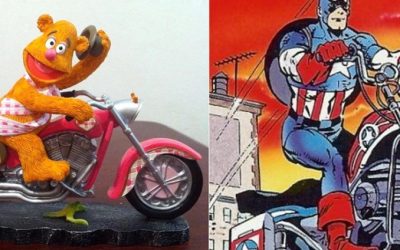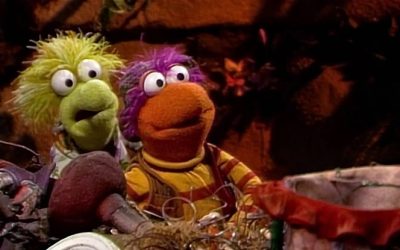Part 1 – Part 2
 You may know him as Stinky the Stinkweed. You may know him as Murray, the Word on the Street monster. You may know him as one of the writers of Elmo in Grouchland, Muppets From Space, and Kermit’s Swamp Years, not to mention being the head writer on Sesame Street. Well, we know him as Joey Mazzarino. And, y’know, all those other things we mentioned in this paragraph.
You may know him as Stinky the Stinkweed. You may know him as Murray, the Word on the Street monster. You may know him as one of the writers of Elmo in Grouchland, Muppets From Space, and Kermit’s Swamp Years, not to mention being the head writer on Sesame Street. Well, we know him as Joey Mazzarino. And, y’know, all those other things we mentioned in this paragraph.
Besides being a veritable Muppet Rennaisance man, Joey Mazzarino is a supercool guy, because he took the time to sit down with us for an interview all about what it’s like to be the head writer on Sesame Street.
So what are you waiting for? Look down about half an inch and start reading!
ToughPigs: First of all, congratulations on winning the WGA award [for Elmo’s Christmas Countdown] last week.
Joey Mazzarino: Thank you.
TP: Were you actually at the ceremony?
JM: I was. The great part about that was that they were honoring Norman Stiles. Norman was my first head writer, and he taught me a lot about comedy writing. He was being honored for the Herb Sargent Award that night.
TP: Wow, that’s awesome. So, you are the head writer on Sesame Street this year. How did you get that job?
JM: Belinda Ward was head writer last year and she was having a hard time balancing work and her family, she didn’t want to do it, they asked me to do it, and I wasn’t sure if I wanted to give up my free time, because Belinda had to be there a lot. So I thought I’d give it a try. And it’s actually pretty fun. It’s hard though. 26 episodes doesn’t sound like a lot, especially when we used to do 130, but 26 stories that are 12-15 minutes long, it’s been tough.
TP: How do you break up the writing duties?

JM: There are about nine other writers beside myself, and they’re all given an assignment, and you’ll get assigned characters. So you might get Elmo, Snuffy, Big Bird, whatever. You can also trade, like “I really want Telly for this one, can I have Telly?” Then they’ll come and meet with me, and they’ll have their curriculum laid out with the letter and number and pitch me a story based on the characters in their cast list and we’ll work on it from there.
TP: So, you started as a puppeteer, but some of your writing is pretty early on in your career. Did you set out to be a performer or a writer?
JM: I set out to be a performer. I didn’t even know about puppetry until college. I didn’t know that was a job. Camille Bonora came to teach improv at my college. At the time I was working for a nursery school and we’d watch a lot of Sesame with the kids in school. She said that she worked on Sesame Street as a puppeteer, and I asked “What a great job! What do you do?” and she said, “Oh, I do this character Meryl Sheep…” and I said, “Meryl Sheep! You did the Sophie’s Choice accent, that’s really great!” She said, “You watch it? You really know the stuff?” I said yeah, and she said I could come and meet Jim one day. I said that’d be great, and then a year and a half went by and I never saw her again.
Then I was lighting a show at Fordham and she came and she said, “Oh, I told you you could come and visit the set. Jim’s going to be here next week, why don’t you come?” And I went and visited and I got to meet Jim, and I was very tongue-tied and didn’t know what to say. But he was very gracious, and we talked about Fordham because he’d gotten an honorary degree from there. So I was watching those guys work, especially Richard Hunt. I think Richard was doing a butler, and he had the puppet’s hands behind his back and he was really very funny, but the stuff he was saying off camera was even funnier, he was cracking the crew up. And I just said, “I want to be that guy!” So I put on a puppet, and Camille said, “You know, this is really hard, some guys have been doing this since they were little kids, it’s really tough.” I said I don’t care. I said, “Give me a tip,” and she said, “Just drop the thumb.” So I’d practice while talking on the telephone, and I went back to the costume shop at Fordham and I asked the professor if I could borrow some fabric and wigs and stuff, I started building Frankenstein’s puppet.
TP: I hope you still have that puppet somewhere.
JM: I do, it’s at my parents’ house, I think. It was awful, it was terrible. I had my “Of Muppets and Men” book I got from my brother-in-law, and I put a camera up in my bedroom. During the day when I wasn’t at school, I’d practice and rehearse in front of the camera. I was obsessed with building my puppets, and my parents thought I was insane, they really thought I went nuts. Then I sent in a tape and Kevin Clash invited me to a workshop. And that’s how I got into puppetry.

I didn’t know I could write, I was a terrible writer. I was literally the worst grammarian in school. At the end of the year, after 120 episodes, they needed characters, so they said we could go to the Workshop and look at any characters we wanted to do. I saw this little black lamb and I came up with this little commercial for “Colambo“, I put it up for the writers, and they thought it was funny. Lisa Simon, God bless her, she said to me, “Do you want to try writing?” I said no, I’m a terrible writer, I can’t do it. She said, “Well, we pay for the audition,” and I said, oh yeah!
TP: And this was after your first season?
JM: This was probably 1991, so probably my second season.
TP: Can you describe the writing process for an episode of Sesame Street?
JM: Yeah, so I’m a writer and I get my assignment for, say, episode 4210. It’s science and nature, I’ve got Big Bird in my cast, so I’m going to write a show about migration. I’d go to the head writer, I’d pitch my story about Big Bird, he wants to migrate, this real estate worker sells him on a new home and at the end Big Bird decides he wants to leave, and what’s that going to do to everybody? Everyone’s like, “You can’t leave, this is your home, this is your habitat,” and I’d pitch that to the head writer and he’d say, “Yes this is great,” or “No, let’s work on it some more.” So you’d work it out and look at the curriculum and figure out what each scene is going to be, you’d go off and write it, hand it in, the head writer will look at it and give you some notes, you’d take a second pass at it then you’d do a polish on it based on research and producer’s notes. It’s pretty autonomous, it’s the most autonomous writing job I’ve ever heard about, especially in television because there’s not a lot of network involvement, PBS is pretty hands-off. You might hand that all off at once and do your inserts later, when you’d pitch your parodies and you’d pitch your letter films.
TP: So the writers just pitch whatever they come up with?
JM: Sometimes we go, “Hey we need things about near and far” or something, but normally we say we need some parodies, like we’ll have a Mad Men parody this year and Jon and Kate Plus 8.
TP: The recent ones have been really great.
JM: Oh yeah? Which ones did you like?
TP: Like Pre-School Musical…
JM: That was me!!
TP: Are there certain characters you really like writing for?
JM: Telly Monster is my favorite. I don’t understand why kids don’t love Telly more. I love all the characters, I honestly do, but it took me the most time to write Big Bird. For some reason, I couldn’t nail Big Bird’s voice as quickly as everything else. But Telly I just fell in love with right off the bat. I love writing Grover, Grover is awesome. I love writing for Elmo, Elmo’s really fun to write for too. My favorite thing is when we came up with Rocco, Zoe’s pet rock. I love it because it shows this darkness to Elmo, like Elmo gets mad. “It’s not a pet, it’s a rock!” I wrote Rocco first, and when I found that little dynamic, Elmo suddenly got a whole other side to him, it’s not all super sweet.
TP: Do you have any favorite scripts that you wrote?

JM: The first time I got to write and direct my own show, it was the opening air show last year with the Indiana Jones parody. It’s got Telly, who I love. It’s got Chris, who I love.
TP: Murray is in that one too, right?
JM: It’s got Murray. I actually didn’t love that Murray was in it. I kinda keep Murray like, who’s the guy on Fraggle Rock? Uncle Traveling Matt. Because I feel like he goes out into the real world, and when we put him on the Street, there’s just a million characters who can service this. We wanted to try it, and I didn’t think it was that great. Plus, it’s really hard to direct when you’re in it. But I loved coming up with big ideas, like the giant 8-foot boulder. And to parody my favorite film in the world, it was great. The new sequel had just come out, and I’m like, “I can finally parody Indiana Jones!”
TP: That was a pretty ambitious episode.
JM: It was a little ambitious. We actually took a day and a half to shoot it instead of just one day. But just because it was my maiden episode for writing and directing, it’s probably my favorite one.
TP: Do you have any least favorite scripts?
JM: Maybe if I go back and look at the first scripts I wrote, because I didn’t know anything about writing. My first Street scene that I wrote, I just remember there were a lot of stupid, obvious, punny things like the Count with a bat, but it was a baseball bat. I remember being in the control room, and Jon Stone was there and he didn’t know I was there, and someone said, “Should we do it again?” and he said, “It’s not worth it.” At the time, I was so crushed, but looking back, he was right. I didn’t know what I was doing. It wasn’t until maybe my third season when I wrote one that I loved. It was called “Cindertelly”. Flo Bear, who was an awful character, was writing this story called Cindertelly, and there were these little mice getting him ready for a bowling ball.
TP: We heard that the target audience is younger than it used to be. Has that influenced the way you write?
JM: We’ve made a conscious decision that we’re aiming for three, because that’s our target, but I’m still pushing to get that comedy in there for adults. But is it tougher? No, but if I feel like there’s pressure to start taking jokes out, then I get mad. And in my first year as head writer, I’m trying to keep a really consistent comedic voice in the show. Right now, I don’t feel it as much. I’m trying to push a lot of the physical stuff and I want to stay away from the talking-to-the-camera stuff. I don’t mind talking to the camera like we’ve always done on Sesame, but trying to elicit answers from kids really bugs me out.
 Click here for part two of our interview, where you’ll hear Joey talk about Horatio the Elephant, Muppets From Space, and some super special surprises coming up in season 40!
Click here for part two of our interview, where you’ll hear Joey talk about Horatio the Elephant, Muppets From Space, and some super special surprises coming up in season 40!
Click here to drop your thumb on the ToughPigs forum!



